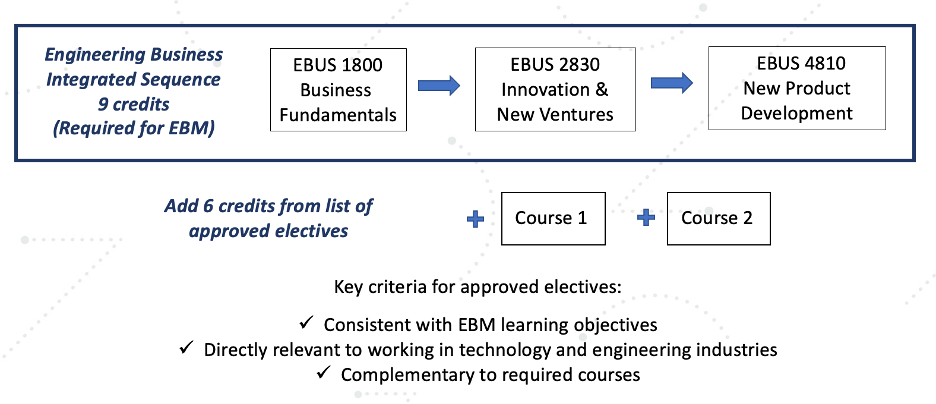Business and Entrepreneurship Programs
Technology continues to have a massive effect on every sector of our economy and society, and history has shown that innovation drives business cycles. Students can prepare themselves for a successful start to their careers by pursuing the Engineering Business Minor (EBM) or one of the business and entrepreneurship minors offered at the University of Virginia.
Engineering Business Minor: This program will teach students to understand a company's financials and operations, evaluate market opportunities, develop products with winning value propositions and build professional skills. If you're interested in working in product management or engineering, as well as building businesses in technology-centric industries, this minor is for you. The skills you develop will help you whether you are working in a large company or emerging venture. The Engineering Business Minor is conferred by the Engineering School and designed with input from its accomplished alumni, including business leaders and recent graduates. Students interested in the EBM’s topics but not looking to earn a minor can consider taking a subset of the courses.
General Business Minor: This program offers a broad overview of fundamental business knowledge and skills that will prepare them to make a positive impact at work and in society. Designed for students from all academic backgrounds, the minor covers the basics of accounting, finance, marketing and digital skills for the workplace. The minor is conferred by the McIntire School of Commerce and intended for students who seek exposure to a broad array of business topics.
Entrepreneurship Minor: This program provides an education with the tools, techniques and transformations involved in new venture development. This experiential program is a great choice for students who are interested in founding or joining a startup, either now or later. It's also a good choice if you're interested in intrapreneurship, which involves starting new ventures in established firms or not-for-profit organizations. While conferred by the McIntire School, the program offers three concentrations, two in partnership with other schools: Technology Entrepreneurship with the Engineering School, Social Entrepreneurship with the Batten School of Leadership and Public Policy, and Innovation in Business.
Detailed information on each minor can be found below and by following the included links. Click here for more information about the Engineering Business Minor and a comparison to the General Business and Entrepreneurship minors
Note: STS courses related to engineering business and technology entrepreneurship were relabeled as EBUS courses starting in the 2024-25 academic year. The course numbers have remained the same. A course taken with the STS code can be used to fulfill a similarly numbered EBUS requirement.
Applying to the Engineering Business Minor
Students may apply to the Engineering Business Minor (EBM) during the Spring '26 application cycle, which will be held coincident with or after the First-Year Major Declaration process. All years will be eligible to apply. As the time approaches, we will send out an email announcing the application cycle. Additionally, a link to the straightforward and easy-to-complete EBM application will be posted in this section of this web page.
Engineering Business Minor
The Engineering Business Minor is designed for students interested in engineering, product management and working in technology-centric businesses.
Based on the dynamics between innovation and business, as well as student, alumni and faculty feedback, the UVA Engineering Business Minor will encompass business basics, product development and professional skills. The minor requires completion of 15 credits, including 9 credits of required courses and 6 credits selected from an approved elective list.
Click here for an overview of the new Engineering Business Minor.

Note: The Engineering Business Minor was updated in Fall 2024. Students enrolled in the previous Engineering Business Minor may click here to find more information on requirements and approved electives.
- Develop an understanding of company structures, how functions work together to serve customers, and differences between early-stage ventures and established large companies.
- Be able to comprehend and create financial statements and evaluate businesses via basic financial analyses.
- Learn how to apply techniques to identify unmet customer needs, evaluate market opportunities, and define compelling value propositions.
- Acquire an understanding of product development and business building frameworks and learn how to apply them to achieve product-market fit.
- Appreciate the role innovation plays in business and learn how to look for and develop opportunities to leverage technology to create value.
- Build professional soft skills in communications, self-awareness, teamwork, and continuous learning.
The Engineering Business Minor will require 3 courses (9 credits):
- EBUS 1800 Business Fundamentals:
This course introduces students to key business topics relevant to high technology companies. Students will learn how to understand and interpret financial statements and frame financial decisions, including building a business case. The course will explore typical organizational structures and the roles of business functions. Students will be introduced to business models and other concepts in marketing and business strategy. - EBUS 2830 Innovation & New Ventures:
An introduction to concepts innovators use to solve problems and create value by addressing unmet needs. Learn how to identify and evaluate opportunities and use proven entrepreneurial frameworks to create new products and businesses for companies of all sizes. Through class activities, projects, and presentations you will learn how storytelling, teamwork, and leadership skills are essential for starting, funding, and building your business. - EBUS 4810 New Product Development:
Students will learn the fundamentals of product management. Topics include identifying unmet needs, understanding markets, implementing product development frameworks and processes, building businesses, and working with multi-functional teams. The application of these concepts to different phases of the product lifecycle will be explored. Students will build technical, professional, and soft skills necessary for success in product management.
Note:
- In general, substitutions are not allowed for any one of the EBM’s three required core courses.
- EBUS courses previously taken under the STS code with the same number can be used to fulfill the EBUS requirements.
The Engineering Business Minor requires two electives to be selected from a curated list. Approved electives must meet the following key criteria:
- Consistent with EBM learning objectives
- Directly relevant to working in technology and engineering industries
- Complementary to required courses
Students can choose from the following approved electives.
EBUS Electives (formerly STS)
Outside of the three required EBM core courses, any EBUS course in the catalog is an acceptable elective for the EBM. Usually, the school offers one to two elective EBUS courses a semester. Recent offerings include the following:
- EBUS 2730 Engineers & the Art of the Deal
- EBUS 2840 Entrepreneurial Finance
- EBUS 2850 Government & Entrepreneurship
- EBUS 2890 Driving Business Growth Through Innovation: Past to Present
- EBUS 3570 Special Topics in Eng Business: Leadership in the Tech Sector
- EBUS 4580 Special Topics in Eng Entrepreneurship: Innovation Garage
Note: EBUS courses previously taken under the STS code with the same number can be used to fulfill the EBUS credits.
COMM Electives
Selected courses, directly applicable to engineering business, that meet the EBM’s elective criteria. Note that many 4000-level COMM classes are restricted to McIntire students.
- COMM 2600 Leadership Across Disciplines
- COMM 3200 Project & Product Management
- COMM 3230 Managing Innovation
- COMM 3410 Commercial Law I
- COMM 3845 Foundations in International Business
- COMM 3880 Global Sustainability
- COMM 4822 Investing in Sustainable Future
- ENTP 1010 Introduction to Entrepreneurship
SEAS Departmental Electives
Selected departmental courses that are closely related to product development and key business capabilities, e.g., innovation, design and commercialization. Courses may also be used to satisfy a corresponding major’s technical elective requirements, helping students with accessibility of the minor (students should check their major’s technical elective requirements).
- APMA 3150 From Data to Knowledge
- BME 3030 Innovation & Design in Medicine
- CE 2030 Management of Eng & Construction Projects
- CE 3010 Project Business Planning
- CS 4260 Internet Scale Applications
- ENGR 4880 Business & Tech Leadership in Engr
- MAE 4502 Special Topics: The Business of Engineering
- SYS 2/3054 Systems case Studies (Int’l)
- SYS 4000 Financial Aspects of Engineering
- SYS 4044 Engr Economic Systems
Other Electives
Selected courses that meet the EBM’s elective criteria.
- ECON 2010 Principles of Econ: Microeconomics
Get In Touch
Questions about the Engineering Business Minor? Get in touch with us.
Robert Riggs

Gregory J. Gerling
My research interests span the fields of haptics, computational neuroscience, biomechanics, human–machine interaction, UX/UI, and human factors and ergonomics. We investigate cutaneous and proprioceptive cues that convey an object’s softness, and neural and biomechanical bases of social and emotional touch, and soft tissue manipulation or massage.
McIntire School of Commerce General Business Minor
The General Business Minor is administered by the McIntire School of Commerce. Information related to this program can be found on General Business Minor page from the McIntire School website.
If you have questions about General Business Minor, please contact the McIntire School of Commerce.
The Entrepreneurship Minor
The entrepreneurship minor is administered by the McIntire School of Commerce. Information related to this program can be found on the Entrepreneurship Minor page on the McIntire website.
If you have questions about the Entrepreneurship Minor, please contact the McIntire School of Commerce. Questions specifically related to courses required for the Technology Concentration can be directed to Engineering School Entrepreneurship Lead.
Entrepreneurship Cocurricular Opportunities
Please also note that UVA offers a variety of entrepreneurship cocurricular activities, competitions, student organizations, and alumni mentoring. The Foundry is UVA's center for student entrepreneurship. Information can be found on The Foundry's website, including how to participate in the Entrepreneurship Cup, UVA's premier entrepreneurship competition. Engineering students can also apply to the school’s VentureForward program. For more information about the broader UVA entrepreneurship ecosystem and initiatives, please see the UVA Innovates website.
The information contained on this website is for informational purposes only. The Undergraduate Record and Graduate Record represent the official repository for academic program requirements. These publications may be found here.